If you’re serious about making movies, then film schools are not your best option for training and development. Sure, going to film school will provide you an opportunity to meet other creative people, make some short films, and use video cameras and video editing equipment. And we know that you’ve heard about such big names as George Lucas, Marty Scorsese, and Spike Lee going to film school.
But it’s 2011, not 1975. When Lucas attended USC, there was no home video and no Netflix. In order to watch movies, you literally needed a movie projector and the actual film print. When Scorsese was learning his craft, there were no HD cameras or Final Cut Pro Editing systems. It was actually cheaper to pay a couple thousand dollars in tuition than to get your hands on expensive and hard to find film cameras & editing equipment.
What About the Cost of Film Schools?
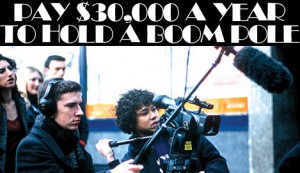 In the last 10 years the cost of film and video equipment has dropped sharply. And at the same time, the cost of film school tuition has risen just as sharply.
In the last 10 years the cost of film and video equipment has dropped sharply. And at the same time, the cost of film school tuition has risen just as sharply.
These days, you can set up your own Professional Video Production Company for less than the cost of a semester at film school. (An HD Camera, Lights, Sound Equipment, Final Cut Pro Editing System is less than the $15,000 a semester at New York Film Academy or the $22,000 at NYU or USC).
And at most film schools, you spend up to 80% of the time working on other people’s films. What does that mean? It means you are spending $30,000 a year to hold a boom pole. And you are sharing equipment that you could have bought with your tuition with hundreds of other students.
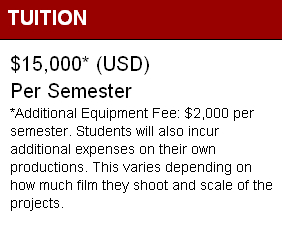 Equipment at film schools is notoriously beaten up and battered by use of so many students. Additionally, on top of the tuition, students at every film school in the world (except Florida State University) are requires to pay additional production fees for film equipment. To the left is a screenshot from New York Film Academy’s website. Notice that students are responsible for a flat $2,000 equipment fee plus any additional costs that may incur during their time at school. This begs the question: where does the $15,000 tuition go if the cameras they use only cost $4,000 to purchase, and they are being shared by over 100 students?
Equipment at film schools is notoriously beaten up and battered by use of so many students. Additionally, on top of the tuition, students at every film school in the world (except Florida State University) are requires to pay additional production fees for film equipment. To the left is a screenshot from New York Film Academy’s website. Notice that students are responsible for a flat $2,000 equipment fee plus any additional costs that may incur during their time at school. This begs the question: where does the $15,000 tuition go if the cameras they use only cost $4,000 to purchase, and they are being shared by over 100 students?
Schools like New York Film Academy graduate thousands of students every year at $30,000 a head, which adds up to millions of dollars of income. This money doesn’t go towards buying new film equipment. Film schools that teach actual filmmaking courses all use the same Arri-S Cameras that are over 50 years old. These cameras were the pinnacle of technology in 1960, but are no longer used in the industry. Furthermore, these cameras can be rented for only $150 a day… the same daily rental rate as most HD video cameras.
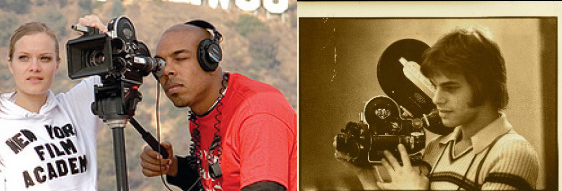

But Film Schools Get You “Connections”, Right?
Many applicants to film schools look past the enormous cost of film schools because they have heard that film schools are the only place to make “connections” in the film industry.
Unfortunately, the truth about how the business actually works is far different. Film schools are a great place to meet other film students looking for connections. You might meet people in the business through an internship, but you can get the internship without school. You may have a Professor who knows somebody… but ultimately you are competing with 100 other students to get a “favor” from this one person who is only peripherally connected in the business. Plus, few film professors are actively working in the industry… which is why they are Professors.
Beyond that, many applicants dream that film schools will lead to a job or career in the film business by providing insider connections to production companies and studios. NYU, considered to be one of the top film schools in the country, recently discontinued their Career Connections service. Now alumni of Tisch get access to a “Monster.Com” type website with a mish mash of internet based job listings you could get yourself though Google. But even when a school like NYU or USC offers job placement assistance, it isn’t what you’d think.
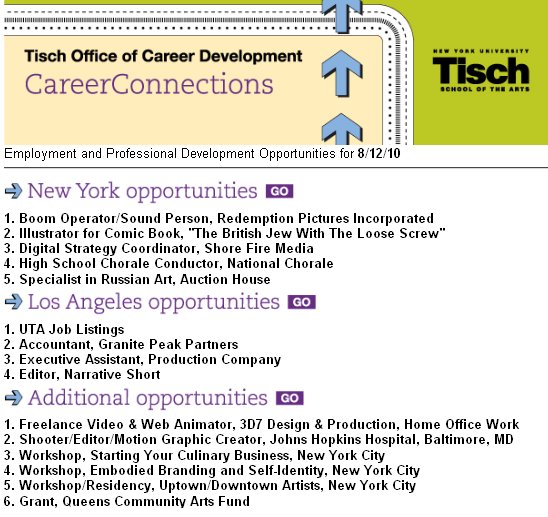
This is an excerpt from the old Tisch Job List Serve. As you can see, after investing $230,000 in Film School, a graduate has very few opportunities available to them. The only film related job in this list is the Boom Pole operator position, which is a job that requires holding a pole. The reason why? Most employers do not want to hire film school students for real film work; they’d rather hire people with experience on real film sets.
So What Happens to Alumni of Film Schools?
Film School are like any business; they use marketing techniques to make their product appear more attractive. If you visit the New York Film Academy website, for instance, you will see a huge banner proclaiming the success of a film graduate who directed a feature with Jesse Eisenberg & Melissa Leo. The site features stories of other alumni and their working experiences within the film business.
This really makes the school look like a good investment at first glance. But here are some things to consider.
- Why do film schools need to highlight it when a graduate makes a feature film that gets any kind of exposure? It’s because less than 1% of graduates every make a real movie. NYFA graduates thousands of students every year. USC & NYU graduate fewer, but it is still in the hundreds. And out of all those people, there is usually one who becomes a success story. NYU Alumni Grad Ryan Fleck made the Award Winning “Half Nelson” a few years ago. This was big news. To date, he is only one of less than 10 NYU Grads to make a notable feature film in the last 10 years.
- Many of the success stories from New York Film Academy & other film schools are people like Chord Overstreet, Eve Hewson, & Clark James Gable. What do these successes have in common? Famous parents. Chord is the son of famous musicians, Eve Hewson is the daughter of Bono (yes Bono!) & Clark James Gable is the grandson of… you guessed it, Clark Gable. Many famous people do send their kids to film schools like NYFA. Which is a great idea, if you have $100,000 to kick around. But if you aren’t rich, you may want to think twice.
- Success stories make great press. What doesn’t? The reality of what happens to most film school graduates. The Art Institutes, a school that costs $99,000 for 3 years of playing with inexpensive video equipment, publishes it’s own job placement stats. There are surprisingly honest.
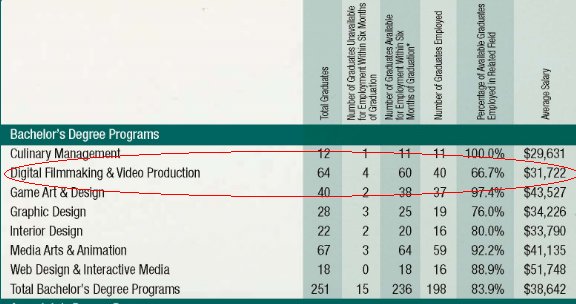
Realistically, most graduates of film schools have a hard time finding work. The business is fiercely competitive, and starting salaries are lower than in most other trades. Some things to think about.
- $31,000 a year is about $15 an hour, or $460 a week after taxes. If you borrowed $99,000 for school, that’s roughly $500 to $1100 a month in student loans to pay back, when your monthly income is only $1860.
- $31,000 a year is misleading; in the film business most work is irregular with work days lasting from 15 to 18 hours. And truth be told, there are very few entry level jobs that pay $15.50 an hour. They are usually $75 to $100 a day, or $10 an hour, depending on the gig.
- The jobs these grads are getting could have been gotten much easier without film schools; and do not require any special skills taught at school.
Below is a clip from Kevin Smith’s comedy “Jay & Silent Bob Strike Back” with Chris Rock and Jamie Kennedy. As many of you may know, Kevin Smith dropped out of film school. This 30 second bit is satire, but it reflects the reality of graduates of film schools in the business. (Warning: explicit language… hey, it’s Chris Rock!)
So What Is Actually Taught at Film Schools?
Even if an aspiring filmmaker realizes that film schools may not equipment, connections, or great job placement… many are still stuck on this final misperception: that film schools teach invaluable or hard to learn skills you cannot acquire elsewhere. If that were so, then most of your favorite filmmakers would never have made a movie.
Film schools teach only the basics of filmmaking. Again, back in Martin Scorsese’s day, this information was hard to find and may have warranted schooling. But today, more film careers have been launched by people playing around with cameras, teaching themselves how to direct, and using Youtube than by film schools.
The courses at film schools are all the same. They teach:
- Continuity
- Dialog
- Editing
To illustrate, these are some sample student films, produced as “exercises”, from high priced film schools.
This is an NYU Student Film costing $40,000 in tuition.
This is a USC Student Film that costs $40,000 in tuition.
This is a New York Film Academy Film, in a program that costs $18,000 a semester.
In classes where students use color films or video, sample projects have a similar feel.
This is an NYU Student “Color Synch” short film.
And a New York Film Academy film shot on a DVX100 camera in 2010 (this cameras costs $2,000 to buy and has not been cutting edge since 2005).
So Is There Any Good News for Aspiring Filmmakers?
The above student films have elicited laughter and disbelief from members of the professional community. Most working filmmakers who skipped school cannot believe the remedial quality of the projects being produced inside these educational institutions. And in general, most people are shocked when they learn the truth about film schools.
But this isn’t all doom and gloom. It is actually great news for most aspiring filmmakers. It is 2011, and everything has changed. Once you understand the truth about film schools, you are free to start making movies the right way. What is the right way? By picking up a camera and shooting your own movies on your own, without paying tuition. Then sharing them with the world and meeting collaborators through the internet.
This silly comedy short shot by a Youtuber named Andy Morgen with no training won the Funny or Die Grand Prize at the 2011 LA Short Film Fest and exposure throughout the industry.
For a more serious take, this short film was shot by Steve Morrow on 35mm film just because he wanted to do it.
Finally, this fanmade video got the director more meetings in Hollywood than any film school student film festival winner.
A Powerful, Affordable Alternative to Film Schools
If you are one of the thousands of aspiring filmmakers who feels that film schools are not for you… and if you have the passion, dedication, and energy to pursue your dreams…. then check out the “Film School Secrets” Film Career Course.
Our course is not like regular film schools. We don’t talk about shooting short films or bog you down with technical stuff you could learn online. This course is a direct, no BS, practical guide to launching your film career no matter where you live in the world. We talk about how to get on real film sets and learn from pros who are on the job, network with real filmmakers, start planning your first real movie, and how to hire film school students to work for you. It’s designed exactly to answer the question “Where do I start?”
For more information about exactly what is taught inside “Film School Secrets”, click here. And feel free to explore the site or email us with any questions.
We hope you have found this page to be informative regarding film schools, and that it makes a difference as you purse your filmmaking dreams!
 Film School Secrets: Insider Advice for Aspiring Filmmakers Learn Filmmaking as Creative Professional, Not a Starving Artist
Film School Secrets: Insider Advice for Aspiring Filmmakers Learn Filmmaking as Creative Professional, Not a Starving Artist 